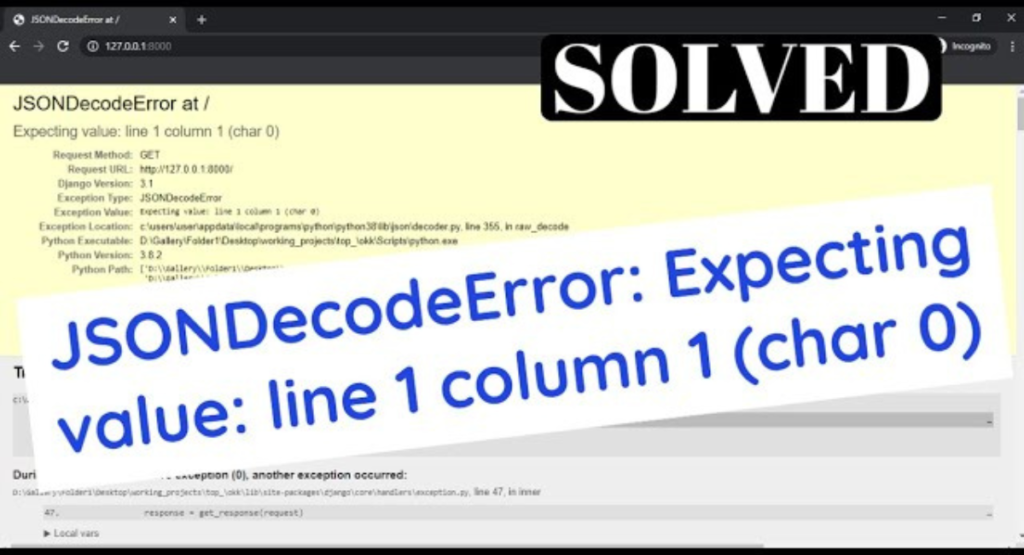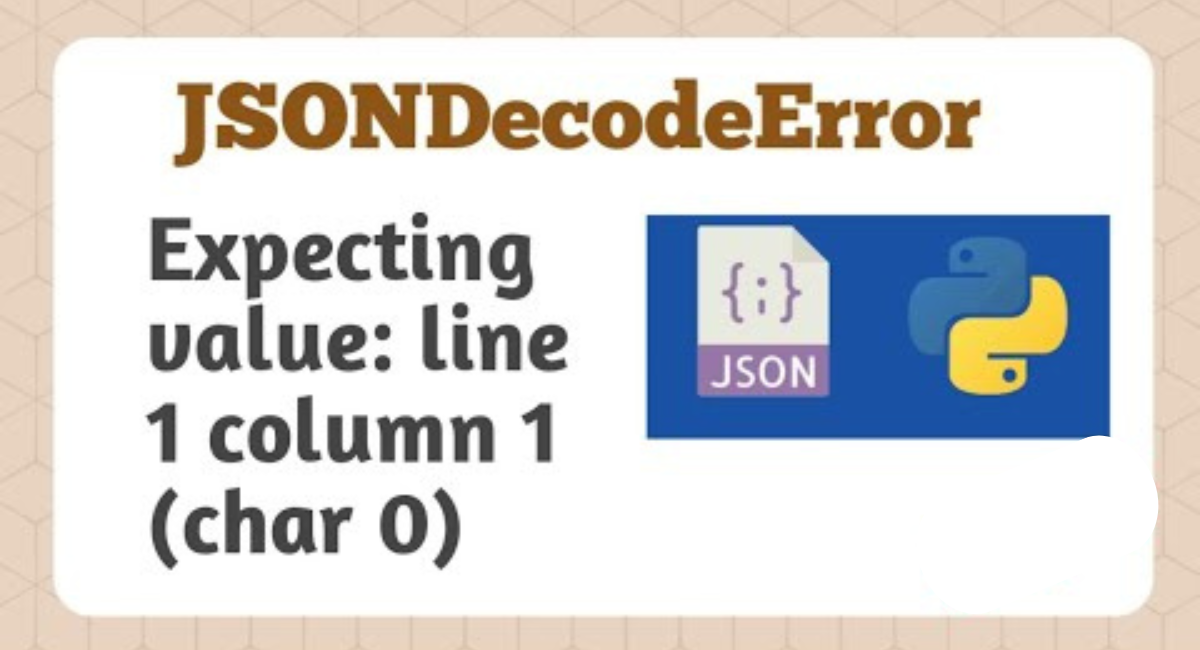When working with JSON data in Python, encountering errors is a common issue. One particularly frustrating error is json.decoder.JSONDecodeError: Expecting value: line 1 column 1 (char 0). This error usually occurs when attempting to parse a JSON string or file that is either empty or improperly formatted. This article will provide a comprehensive guide to understanding this error and offer solutions to resolve it.

What is JSONDecodeError?
JSONDecodeError is a specific type of exception in Python’s json module, which is raised when the json.loads() or json.load() functions fail to parse a JSON document. This error generally indicates that the JSON data is not valid according to JSON syntax rules.
Error Breakdown
The error message json.decoder.JSONDecodeError: Expecting value: line 1 column 1 (char 0) provides specific details:
Expecting value:The parser was expecting a value but didn’t find any.line 1 column 1 (char 0):The error occurred at the very beginning of the document (line 1, column 1), meaning the parser encountered an issue right at the start.
Common Causes
- Empty Input: The most common cause is that the input JSON data is empty. If you try to parse an empty string or file, you will encounter this error.
- Improper File Handling: If you’re reading from a file, ensure the file path is correct and the file is not empty or unreadable.
- Incorrect Data Type: The input to
json.loads()orjson.load()must be a string or a file-like object. Passing other data types can cause this error. - Encoding Issues: Sometimes, encoding issues can cause the file to be read incorrectly, resulting in an empty or malformed JSON string.
Also Read: Golden State Warriors vs Denver Nuggets Match Player Stats | Phoenix Suns vs Boston Celtics Match Player Stats | New York Liberty vs Chicago Sky Match Player Stats
Steps to Resolve the Error
Here are some practical steps to diagnose and resolve the JSONDecodeError:
1. Verify the Input Data
Ensure that the JSON data you are trying to parse is not empty. Check the source of the JSON data (e.g., a file, a web request) to confirm that it contains valid JSON content.
Example:
python Copy code
import json
data = '' # This is an empty string
try:
json_data = json.loads(data)
except json.JSONDecodeError as e:
print(f"Error: {e}")
2. Check File Handling
If you are reading JSON data from a file, make sure the file is not empty and that it is being read correctly.
Example:
python Copy code
import json
with open('data.json', 'r') as file:
try:
json_data = json.load(file)
except json.JSONDecodeError as e:
print(f"Error: {e}")
3. Validate JSON Format
Ensure that the JSON data is properly formatted. You can use online tools or validators to check if the JSON string is valid.
Example:
python Copy code
import json
data = '{"name": "John", "age": 30}' # Valid JSON
try:
json_data = json.loads(data)
except json.JSONDecodeError as e:
print(f"Error: {e}")
4. Handle Encoding Issues
Verify the encoding of the JSON file. Ensure that it is in a format that Python can read (usually UTF-8).
Example:
python Copy code
import json
with open('data.json', 'r', encoding='utf-8') as file:
try:
json_data = json.load(file)
except json.JSONDecodeError as e:
print(f"Error: {e}")
Testing and Debugging
To effectively debug and test for these issues, consider the following:
- Print Statements: Use print statements to check the content of the JSON data before parsing.
- Exception Handling: Implement robust exception handling to catch and diagnose errors more effectively.
- Unit Tests: Write unit tests to ensure that your JSON parsing works as expected in different scenarios.
Advanced Troubleshooting Strategies
- Verify JSON ValidityUse tools like JSONLint or built-in validation functions to check if your JSON string or file is valid.Example:
python Copy code import json data = '{"name": "John", "age": 30}' # Valid JSON try: result = json.loads(data) except json.JSONDecodeError as e: print(f"Error: {e}")
- Check File Path and AccessibilityEnsure that the file path is correct and the file is accessible. Sometimes, file permission issues or incorrect paths can lead to empty reads.Example:
python Copy code import os file_path = 'data.json' if os.path.exists(file_path): with open(file_path, 'r') as file: try: result = json.load(file) except json.JSONDecodeError as e: print(f"Error: {e}") else: print("File does not exist")
- Debug with LoggingImplement logging to capture the state of the JSON data and errors during runtime. This is especially useful in larger applications.Example:
python Copy code import json import logging logging.basicConfig(level=logging.DEBUG) data = '{"name": "John", "age": "30"}' # Intentionally incorrect JSON try: result = json.loads(data) except json.JSONDecodeError as e: logging.error(f"JSONDecodeError: {e}")
- Use Try-Except Blocks EffectivelyImplement detailed error handling to manage different types of errors gracefully.Example:
python Copy code import json data = '' # Simulated empty input try: result = json.loads(data) except json.JSONDecodeError as e: print(f"JSON Decode Error: {e}") except ValueError as e: print(f"Value Error: {e}") except Exception as e: print(f"Unexpected Error: {e}")
Best Practices for Handling JSON Data
- Validate Input Data: Always validate and sanitize input data before parsing it. This ensures that the data conforms to the expected JSON format.
- Use Default Values: Provide default values or fallback mechanisms when dealing with JSON data from unreliable sources.Example:
python Copy code import json data = '' # Empty input default_value = {} try: result = json.loads(data) except json.JSONDecodeError: result = default_value print(result) # Output: {}
- Ensure Proper Encoding: Use consistent encoding (usually UTF-8) for JSON files to avoid encoding-related issues.
- Handle Large JSON Files: For large JSON files, consider using streaming techniques or libraries like
ijsonto handle data efficiently without loading the entire file into memory.
Conclusion
The json.decoder.JSONDecodeError: Expecting value: line 1 column 1 (char 0) error typically occurs when the JSON data being parsed is empty or improperly formatted. By verifying the input data, ensuring correct file handling, validating JSON format, and addressing encoding issues, you can resolve this error and ensure smooth JSON parsing in your Python applications.
Also Read: Utah Jazz vs Golden State Warriors Match Player Stats | Cleveland Cavaliers vs 76ers Match Player Stats | Phoenix Suns vs Portland Trail Blazers Match Player Stats

